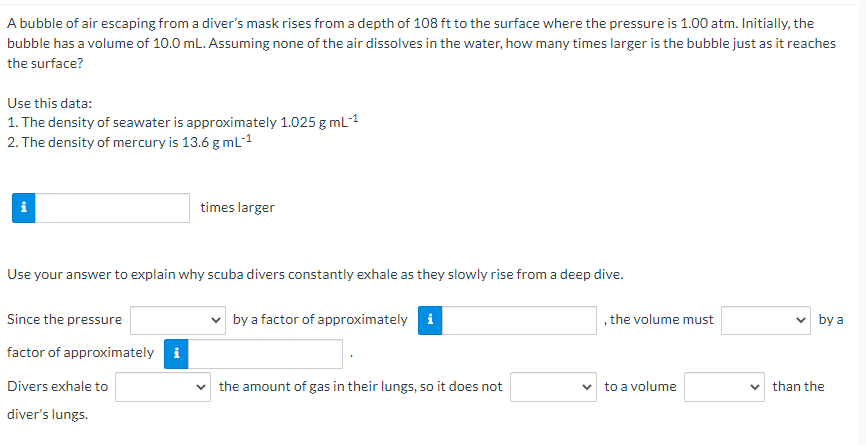A bubble of air escaping from a diver's mask rises from a depth of 108 ft to the surface where the pressure is 1.00 atm. Initially, the bubble has a volume of 10.0 mL. Assuming none of the air dissolves in the water, how many times larger is the bubble just as it reaches the surface? Use this data: 1. The density of seawater is approximately 1.025 g mL-1 2. The density of mercury is 13.6 g mL1 times larger
A bubble of air escaping from a diver's mask rises from a depth of 108 ft to the surface where the pressure is 1.00 atm. Initially, the bubble has a volume of 10.0 mL. Assuming none of the air dissolves in the water, how many times larger is the bubble just as it reaches the surface? Use this data: 1. The density of seawater is approximately 1.025 g mL-1 2. The density of mercury is 13.6 g mL1 times larger
Chemistry: Principles and Reactions
8th Edition
ISBN:9781305079373
Author:William L. Masterton, Cecile N. Hurley
Publisher:William L. Masterton, Cecile N. Hurley
Chapter10: Solutions
Section: Chapter Questions
Problem 30QAP: Air contains 78% nitrogen. At 25C, Henry's law constant for nitrogen is 6.8104M/atm, while at 37C,...
Related questions
Question

Transcribed Image Text:A bubble of air escaping from a diver's mask rises from a depth of 108 ft to the surface where the pressure is 1.00 atm. Initially, the
bubble has a volume of 10.0 mL. Assuming none of the air dissolves in the water, how many times larger is the bubble just as it reaches
the surface?
Use this data:
1. The density of seawater is approximately 1.025 g ml-1
2. The density of mercury is 13.6 g ml-1
i
times larger
Use your answer to explain why scuba divers constantly exhale as they slowly rise from a deep dive.
Since the pressure
by a factor of approximately i
, the volume must
by a
factor of approximately i
Divers exhale to
the amount of gas in their lungs, so it does not
to a volume
than the
diver's lungs.
Expert Solution
This question has been solved!
Explore an expertly crafted, step-by-step solution for a thorough understanding of key concepts.
Step by step
Solved in 3 steps with 2 images

Knowledge Booster
Learn more about
Need a deep-dive on the concept behind this application? Look no further. Learn more about this topic, chemistry and related others by exploring similar questions and additional content below.Recommended textbooks for you

Chemistry: Principles and Reactions
Chemistry
ISBN:
9781305079373
Author:
William L. Masterton, Cecile N. Hurley
Publisher:
Cengage Learning

General, Organic, and Biological Chemistry
Chemistry
ISBN:
9781285853918
Author:
H. Stephen Stoker
Publisher:
Cengage Learning

Chemistry
Chemistry
ISBN:
9781305957404
Author:
Steven S. Zumdahl, Susan A. Zumdahl, Donald J. DeCoste
Publisher:
Cengage Learning

Chemistry: Principles and Reactions
Chemistry
ISBN:
9781305079373
Author:
William L. Masterton, Cecile N. Hurley
Publisher:
Cengage Learning

General, Organic, and Biological Chemistry
Chemistry
ISBN:
9781285853918
Author:
H. Stephen Stoker
Publisher:
Cengage Learning

Chemistry
Chemistry
ISBN:
9781305957404
Author:
Steven S. Zumdahl, Susan A. Zumdahl, Donald J. DeCoste
Publisher:
Cengage Learning


Chemistry: An Atoms First Approach
Chemistry
ISBN:
9781305079243
Author:
Steven S. Zumdahl, Susan A. Zumdahl
Publisher:
Cengage Learning

Chemistry: The Molecular Science
Chemistry
ISBN:
9781285199047
Author:
John W. Moore, Conrad L. Stanitski
Publisher:
Cengage Learning